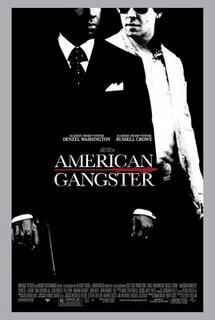
A couple weeks ago, I watched
We Own the Night. That was a formulaic crime drama that borrowed too heavily from the ones that came before it, and was almost workmanlike in its plotting and execution. The new drama,
American Gangster, is probably just as workmanlike and most likely borrows almost as much. The difference here is that director Ridley Scott (
Gladiator,
A Good Year) handles his material in such a way so that it seems just as fresh and intoxicating as it was the first time we saw it. This is so much more than a mere retread, this is a finely crafted piece of filmmaking from everyone involved. The movie is completely engrossing, and keeps up a snappy pace that never once falters. Considering that this is a nearly 3-hour long movie, that's quite a feat.
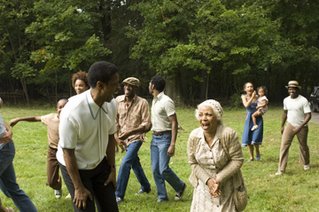 American Gangster
American Gangster is a crime epic that spans a number of years in the lives of two men on opposite sides of the law. On one end, we have Frank Lucas (Denzel Washington), who starts out as a low-level driver working for a powerful Harlem crime boss in 1968. When his boss dies, Frank knows he has carry on his traditions. He decides to get into the drug trafficking trade, and he wants to go straight to the source. He enlists the aid of a family member fighting over in Vietnam to help score him some pure, untouched heroin straight from the jungles of Bangkok. He brings the product back home hidden in military transport, markets it as "Blue Magic", and sells it at a competitive price far lower than the competition. Before long, Frank has more money and power than any crime boss in history. He buys a beautiful new home for his mother (Ruby Dee), enlists his brothers and other family members into his business, and finds himself the champion of both the criminal underworld and a rising celebrity who is invited to lavish parties and events.
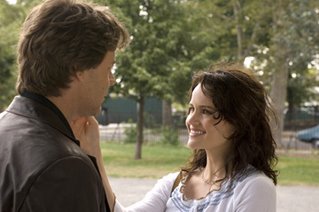
In a parallel plot, we meet Richie Roberts (Russell Crowe), a police detective who is trying to balance his work, a losing battle with his ex-wife (Carla Gugino) over the custody of their son, and passing the necessary exams so that he can become a lawyer. Richie is an honest cop stuck in a sea of dishonest and crooked ones. When he turns in nearly a million dollars that his partner and him find stashed in a car trunk, his fellow officers turn against him. He is increasingly frustrated with the blatant corruption he sees in his precinct, even his own partner, who is eventually revealed to be a heroin addict himself, which leads to his murder. While identifying his partner's body, Richie comes across a packet of Blue Magic on the corpse, and becomes obsessed with discovering what it is and who produces it. It becomes an obsession as Richie is placed at the head of a special anti-drug task force, and when evidence seems to point toward Frank Lucas, a man who seemingly came out of nowhere and rose to absolute power, his obsession only grows in finding out more about the man himself.
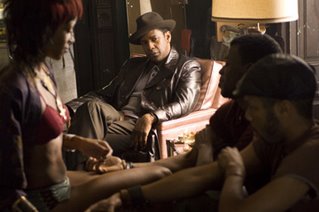
Obsession plays a key role in
American Gangster, as well as in the lives of the two lead characters. Both men follow their individual goals doggedly, and thinking of very little else. Frank is a man obsessed with power and wealth, who counteracts this by passing himself off as a man who emphasizes and stresses the importance of family. As he draws his brothers and cousins into his business, he is ultimately leading them into oblivion, but he does not see it this way, and has convinced himself that he is helping them. Richie, on the other hand, is a man who is so self-obsessed with his job and personal ambitions, he can scarcely think of anything else. This has led him to shun family, friends, and just about everyone in his life who is not involved with the current case he's working on. Their personal obsessions have led to different paths of life. Frank seems to have everything because of it, and Richie seems to have lost everything. When the two men finally do meet late in the film, they (and the audience as well) can both feel that they are not far apart from each other, despite how different they are in everything else.
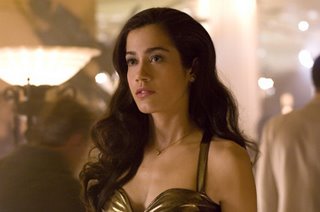
In telling the story of these two men, director Ridley Scott has delivered what is probably his strongest and most surest film in years. He manages to tell the different twisting stories and characters in such a way that the movie keeps on moving, and important characters never get lost in the shuffle. The screenplay by Steven Zaillian (
All the King's Men) is energetic, with a great ear for dialogue. There's not a single moment that rings false, and no scene that drags down the action or comes across as being unimportant. The script is just as interested in these two characters as we are, and gives them many chances to show off their complex personalities. Frank can be a warm and inviting man, such as the scenes we see with his family and closest friends. When one of his brothers tells him "I want to be you", we can understand why. He has power and money to spare, but he never has forgotten who he is and where he came from. And even though he has a ruthless side, which he must display in his line of business, even here he shows a twisted sense of mercy, such as in the film's opening scene where he sets an enemy on fire, then shoots him shortly afterward so he doesn't have to go through the agony of burning to death. These are complex men, accompanied by equally complex performances by Washington and Crowe.
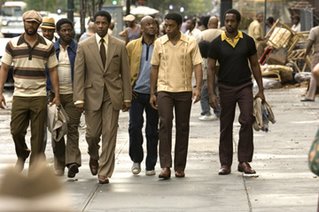
Both actors are able to transform themselves into their respective characters to that rare point that we don't feel like we're watching a performance, but are rather so wrapped into the story that we focus solely on the character up on the screen, and not the celebrity portraying them. This is key for any docu-drama, and one that so many are strangely lacking. A lot of this most likely has to do with the fact that the actors got to actually interact with the real people they were portraying on the set of the film, but their performances never come across as an imitation. Washington breezes easily through charm, rage, and intelligence. His Frank is someone who knows just what to do and what to say in any situation, and we can understand why people are drawn to him and what he has. Crowe's Richie looks kind of like a beaten down, world-weary man who is just looking for what's right in the world. He sees corruption everywhere, and even though he's made a lot of mistakes himself, he's determined to hold onto what little bit of decency he has left within him. The performances bring out each individual aspect of the characters, and that is what ultimately makes them appear so real to us. The actors are not playing for the camera, nor do they get any big staged monologue to ruin the illusion. For the film's entire running time, we are lost in the world of these two, and it is an engrossing and fascinating one.
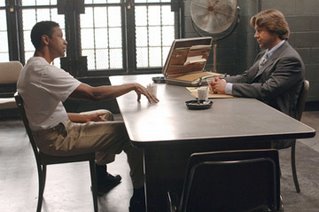 American Gangster
American Gangster hardly ever takes a wrong step, other than a few minor characters could have been developed a little bit more. Needless to say, it is a very small thing compared to how well everything else flows together. The direction, the acting, the editing, even the choice of background music transports us into the story and refuses to let us go until the end credits start to roll. When those credits did come, I felt completely satisfied and certain that I had just had a great experience. This is certain to be remembered by me as one of the great films of the year.
0 comments
 A couple weeks ago, I watched We Own the Night. That was a formulaic crime drama that borrowed too heavily from the ones that came before it, and was almost workmanlike in its plotting and execution. The new drama, American Gangster, is probably just as workmanlike and most likely borrows almost as much. The difference here is that director Ridley Scott (Gladiator, A Good Year) handles his material in such a way so that it seems just as fresh and intoxicating as it was the first time we saw it. This is so much more than a mere retread, this is a finely crafted piece of filmmaking from everyone involved. The movie is completely engrossing, and keeps up a snappy pace that never once falters. Considering that this is a nearly 3-hour long movie, that's quite a feat.
A couple weeks ago, I watched We Own the Night. That was a formulaic crime drama that borrowed too heavily from the ones that came before it, and was almost workmanlike in its plotting and execution. The new drama, American Gangster, is probably just as workmanlike and most likely borrows almost as much. The difference here is that director Ridley Scott (Gladiator, A Good Year) handles his material in such a way so that it seems just as fresh and intoxicating as it was the first time we saw it. This is so much more than a mere retread, this is a finely crafted piece of filmmaking from everyone involved. The movie is completely engrossing, and keeps up a snappy pace that never once falters. Considering that this is a nearly 3-hour long movie, that's quite a feat. American Gangster is a crime epic that spans a number of years in the lives of two men on opposite sides of the law. On one end, we have Frank Lucas (Denzel Washington), who starts out as a low-level driver working for a powerful Harlem crime boss in 1968. When his boss dies, Frank knows he has carry on his traditions. He decides to get into the drug trafficking trade, and he wants to go straight to the source. He enlists the aid of a family member fighting over in Vietnam to help score him some pure, untouched heroin straight from the jungles of Bangkok. He brings the product back home hidden in military transport, markets it as "Blue Magic", and sells it at a competitive price far lower than the competition. Before long, Frank has more money and power than any crime boss in history. He buys a beautiful new home for his mother (Ruby Dee), enlists his brothers and other family members into his business, and finds himself the champion of both the criminal underworld and a rising celebrity who is invited to lavish parties and events.
American Gangster is a crime epic that spans a number of years in the lives of two men on opposite sides of the law. On one end, we have Frank Lucas (Denzel Washington), who starts out as a low-level driver working for a powerful Harlem crime boss in 1968. When his boss dies, Frank knows he has carry on his traditions. He decides to get into the drug trafficking trade, and he wants to go straight to the source. He enlists the aid of a family member fighting over in Vietnam to help score him some pure, untouched heroin straight from the jungles of Bangkok. He brings the product back home hidden in military transport, markets it as "Blue Magic", and sells it at a competitive price far lower than the competition. Before long, Frank has more money and power than any crime boss in history. He buys a beautiful new home for his mother (Ruby Dee), enlists his brothers and other family members into his business, and finds himself the champion of both the criminal underworld and a rising celebrity who is invited to lavish parties and events. In a parallel plot, we meet Richie Roberts (Russell Crowe), a police detective who is trying to balance his work, a losing battle with his ex-wife (Carla Gugino) over the custody of their son, and passing the necessary exams so that he can become a lawyer. Richie is an honest cop stuck in a sea of dishonest and crooked ones. When he turns in nearly a million dollars that his partner and him find stashed in a car trunk, his fellow officers turn against him. He is increasingly frustrated with the blatant corruption he sees in his precinct, even his own partner, who is eventually revealed to be a heroin addict himself, which leads to his murder. While identifying his partner's body, Richie comes across a packet of Blue Magic on the corpse, and becomes obsessed with discovering what it is and who produces it. It becomes an obsession as Richie is placed at the head of a special anti-drug task force, and when evidence seems to point toward Frank Lucas, a man who seemingly came out of nowhere and rose to absolute power, his obsession only grows in finding out more about the man himself.
In a parallel plot, we meet Richie Roberts (Russell Crowe), a police detective who is trying to balance his work, a losing battle with his ex-wife (Carla Gugino) over the custody of their son, and passing the necessary exams so that he can become a lawyer. Richie is an honest cop stuck in a sea of dishonest and crooked ones. When he turns in nearly a million dollars that his partner and him find stashed in a car trunk, his fellow officers turn against him. He is increasingly frustrated with the blatant corruption he sees in his precinct, even his own partner, who is eventually revealed to be a heroin addict himself, which leads to his murder. While identifying his partner's body, Richie comes across a packet of Blue Magic on the corpse, and becomes obsessed with discovering what it is and who produces it. It becomes an obsession as Richie is placed at the head of a special anti-drug task force, and when evidence seems to point toward Frank Lucas, a man who seemingly came out of nowhere and rose to absolute power, his obsession only grows in finding out more about the man himself. Obsession plays a key role in American Gangster, as well as in the lives of the two lead characters. Both men follow their individual goals doggedly, and thinking of very little else. Frank is a man obsessed with power and wealth, who counteracts this by passing himself off as a man who emphasizes and stresses the importance of family. As he draws his brothers and cousins into his business, he is ultimately leading them into oblivion, but he does not see it this way, and has convinced himself that he is helping them. Richie, on the other hand, is a man who is so self-obsessed with his job and personal ambitions, he can scarcely think of anything else. This has led him to shun family, friends, and just about everyone in his life who is not involved with the current case he's working on. Their personal obsessions have led to different paths of life. Frank seems to have everything because of it, and Richie seems to have lost everything. When the two men finally do meet late in the film, they (and the audience as well) can both feel that they are not far apart from each other, despite how different they are in everything else.
Obsession plays a key role in American Gangster, as well as in the lives of the two lead characters. Both men follow their individual goals doggedly, and thinking of very little else. Frank is a man obsessed with power and wealth, who counteracts this by passing himself off as a man who emphasizes and stresses the importance of family. As he draws his brothers and cousins into his business, he is ultimately leading them into oblivion, but he does not see it this way, and has convinced himself that he is helping them. Richie, on the other hand, is a man who is so self-obsessed with his job and personal ambitions, he can scarcely think of anything else. This has led him to shun family, friends, and just about everyone in his life who is not involved with the current case he's working on. Their personal obsessions have led to different paths of life. Frank seems to have everything because of it, and Richie seems to have lost everything. When the two men finally do meet late in the film, they (and the audience as well) can both feel that they are not far apart from each other, despite how different they are in everything else. In telling the story of these two men, director Ridley Scott has delivered what is probably his strongest and most surest film in years. He manages to tell the different twisting stories and characters in such a way that the movie keeps on moving, and important characters never get lost in the shuffle. The screenplay by Steven Zaillian (All the King's Men) is energetic, with a great ear for dialogue. There's not a single moment that rings false, and no scene that drags down the action or comes across as being unimportant. The script is just as interested in these two characters as we are, and gives them many chances to show off their complex personalities. Frank can be a warm and inviting man, such as the scenes we see with his family and closest friends. When one of his brothers tells him "I want to be you", we can understand why. He has power and money to spare, but he never has forgotten who he is and where he came from. And even though he has a ruthless side, which he must display in his line of business, even here he shows a twisted sense of mercy, such as in the film's opening scene where he sets an enemy on fire, then shoots him shortly afterward so he doesn't have to go through the agony of burning to death. These are complex men, accompanied by equally complex performances by Washington and Crowe.
In telling the story of these two men, director Ridley Scott has delivered what is probably his strongest and most surest film in years. He manages to tell the different twisting stories and characters in such a way that the movie keeps on moving, and important characters never get lost in the shuffle. The screenplay by Steven Zaillian (All the King's Men) is energetic, with a great ear for dialogue. There's not a single moment that rings false, and no scene that drags down the action or comes across as being unimportant. The script is just as interested in these two characters as we are, and gives them many chances to show off their complex personalities. Frank can be a warm and inviting man, such as the scenes we see with his family and closest friends. When one of his brothers tells him "I want to be you", we can understand why. He has power and money to spare, but he never has forgotten who he is and where he came from. And even though he has a ruthless side, which he must display in his line of business, even here he shows a twisted sense of mercy, such as in the film's opening scene where he sets an enemy on fire, then shoots him shortly afterward so he doesn't have to go through the agony of burning to death. These are complex men, accompanied by equally complex performances by Washington and Crowe. Both actors are able to transform themselves into their respective characters to that rare point that we don't feel like we're watching a performance, but are rather so wrapped into the story that we focus solely on the character up on the screen, and not the celebrity portraying them. This is key for any docu-drama, and one that so many are strangely lacking. A lot of this most likely has to do with the fact that the actors got to actually interact with the real people they were portraying on the set of the film, but their performances never come across as an imitation. Washington breezes easily through charm, rage, and intelligence. His Frank is someone who knows just what to do and what to say in any situation, and we can understand why people are drawn to him and what he has. Crowe's Richie looks kind of like a beaten down, world-weary man who is just looking for what's right in the world. He sees corruption everywhere, and even though he's made a lot of mistakes himself, he's determined to hold onto what little bit of decency he has left within him. The performances bring out each individual aspect of the characters, and that is what ultimately makes them appear so real to us. The actors are not playing for the camera, nor do they get any big staged monologue to ruin the illusion. For the film's entire running time, we are lost in the world of these two, and it is an engrossing and fascinating one.
Both actors are able to transform themselves into their respective characters to that rare point that we don't feel like we're watching a performance, but are rather so wrapped into the story that we focus solely on the character up on the screen, and not the celebrity portraying them. This is key for any docu-drama, and one that so many are strangely lacking. A lot of this most likely has to do with the fact that the actors got to actually interact with the real people they were portraying on the set of the film, but their performances never come across as an imitation. Washington breezes easily through charm, rage, and intelligence. His Frank is someone who knows just what to do and what to say in any situation, and we can understand why people are drawn to him and what he has. Crowe's Richie looks kind of like a beaten down, world-weary man who is just looking for what's right in the world. He sees corruption everywhere, and even though he's made a lot of mistakes himself, he's determined to hold onto what little bit of decency he has left within him. The performances bring out each individual aspect of the characters, and that is what ultimately makes them appear so real to us. The actors are not playing for the camera, nor do they get any big staged monologue to ruin the illusion. For the film's entire running time, we are lost in the world of these two, and it is an engrossing and fascinating one. American Gangster hardly ever takes a wrong step, other than a few minor characters could have been developed a little bit more. Needless to say, it is a very small thing compared to how well everything else flows together. The direction, the acting, the editing, even the choice of background music transports us into the story and refuses to let us go until the end credits start to roll. When those credits did come, I felt completely satisfied and certain that I had just had a great experience. This is certain to be remembered by me as one of the great films of the year.
American Gangster hardly ever takes a wrong step, other than a few minor characters could have been developed a little bit more. Needless to say, it is a very small thing compared to how well everything else flows together. The direction, the acting, the editing, even the choice of background music transports us into the story and refuses to let us go until the end credits start to roll. When those credits did come, I felt completely satisfied and certain that I had just had a great experience. This is certain to be remembered by me as one of the great films of the year.






0 Comments:
Post a Comment
<< Home